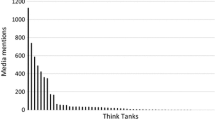Abstract
Think Tanks were “invented” more than thirty-five years ago. However, their actual performance is rather disappointing, with most countries having none and with existing units not supplying essential inputs into public policymaking. Comparison of policymaking needs with actual contributions of Think Tanks highlights many deficits, caused by exogenous and endogenous variables. Harsher adversities facing policymaking make the contributions of Think Tanks all the more necessary, with no existing other institutions being able to substitute for their under-performance. Therefore, breakthroughs are required for upgrading the contributions of Think Tanks to policymaking.
Similar content being viewed by others
References
Afanasyev, V. G. (1971). The Scientific Management of Society. New York: Basic Books (translated from French).
Bacon, Francis (1627). New Atlantis. In Richard Foster Jones, ed., Francis Bacon: Essays, Advancement of Learning, New Atlantis, and Other Pieces. New York: Odyssey Press, 1937.
Badie, Bertrand, and Birnbaum, Pierre (1983). The Sociology of the State. Chicago: University of Chicago Press. Translated from French.
Baehr, R. Peter, and Wittrock, Bjorn (eds.) (1981). Policy Analysis and Policy Innovation: Patterns, Problems and Potentials. Beverly Hills, CA: Sage Publications.
Beloff, Max (1977). “The Think Tank and foreign affairs,” Public Administration 55: 435–444.
Boudon, Paymond (1982). The Unintended Consequences of Social Action. London: Macmillan.
Brecht, Arnold (1978). Kann die Demokratie Überleben? Die Herausforderungen der Zukunft und die Regierungsformen der Gegenwart. Stuttgart: Deutscher Verlags-Anstalt.
Bretzke, Wolf-Ruediger (1980). Der Problembezug von Entscheidungsmodellen. Tübingen: J. C. B. Mohr.
Brewer, Garry D., and deLeon, Peter (1983). The Foundations of Policy Analysis. Homewood, IL: Dorsey Press.
Builder, Carl H. (1983). Towards a Calculus of Scenarios. Santa Monica, CA: The Rand Corporation, N-1855-DNA.
Bulmer, Martin (ed.) (1983). “Social science and policymaking: The use of research in government commission,” American Behavioral Scientist 26 (5) (May/June).
Cameron, Kim S. and Whetten, David A. (eds.) (1983). Organizational Effectiveness: A Comparison of Multiple Models. New York: Academic Press.
Chapman, Richard (ed.) (1973). The Role of Commissions in Policy Making. London: Allen & Unwin.
Checkland, Peter (1981). Systems Thinking, Systems Practice. New York: Wiley.
Checkland, Sydney (1983). British Public Policy 1776–1939: An Economic, Social and Political Perspective. Cambridge: Cambridge University Press.
Clarkson, Albert (1981). Toward Effective Strategic Analysis: New Applications of Information Technology. Boulder, CO: Westview Press.
Collingridge, David (1982). Critical Decision Making: A New Theory of Social Choice. London: Frances Pinter.
Dahrendorf, Ralf (1976). Policy Studies: Summary and Proposals. London: School of Economic and Political Science, private print.
Darwall, Stephen L. (1983). Impartial Reason. Ithaca, NY: Cornell University Press.
David, Paul K., and Winnefeld, James A. (1983). The Rand Strategy Assessment Center: An Overview and Interim Conclusions About Utility and Development Options. Santa Monica, CA: The Rand Corporation, R-2945-DNA.
Dickson, P. (1971). Think Tanks. New York: Atheneum.
Dill, W. R. and Popov, G. Kh. (eds.) (1979). Organizations for Forecasting and Planning: Experience in the Soviet Union and the United States. New York: Wiley, IIASA Series.
Dror, Yehezkel (1971). Design for Policy Sciences. New York: American Elsevier.
Dror, Yehezkel (1980). “Think Tanks: A new invention in government,” in Carl H. Weiss and Allen H. Barton (eds.), Making Bureaucracy Work. Beverly Hills, CA: Sage Publications, pp. 139–152.
Dror, Yehezkel (1983a). Public Policymaking Reexamined. New Brunswick, NJ: Transaction Books, with new introduction.
Dror, Yehezkel (1983b). “New advances in public policy teaching,” Journal of Policy Analysis and Management 2 (3): 449–454.
Dror, Yehezkel (1983c). “Policy-gambling: A preliminary exploration,” Policy Studies Journal 12(1): 9–13.
Dror, Yehezkel (1983d). “Governance redesign for handling the future,” in William Page (ed.), The Future of Politics: Governance, Movements and World Order. London: Frances Pinter, pp. 14–32.
Dror, Yehezkel (1984a). Policymaking Under Adversity. New Brunswick, NJ: Transaction Books, in press.
Dror, Yehezkel (1984b). Advising Rulers: Policy Analysis and Social Sciences for Toplevel Advisors. New York: Russell Sage Foundation, in press.
Dror, Yehezkel (1984c). Advanced Aids for Top Decisionmaking: An Action Approach. Paris: OECD, in press.
Dunn, William N. (1981). Public Policy Analysis: An Introduction. Englewood Cliffs, NJ: Prentice-Hall.
Elster, Jon (1979). Ulysses and the Sirens: Studies in Rationality and Irrationality. Cambridge: Cambridge University Press.
Enke, Stephen (1967). Think Tanks for Better Government. Santa Barbara, CA: Tempo Corporation.
Eran, Oded (1979). Mezhdunarodniki: An Assessment of Professional Expertise in the Making of Soviet Foreign Policy. Ramat Gan: Turtledove.
Estrin, Saul and Holmes, Peter (1983). French Planning in Theory and Practice. London Allen & Unwin.
Faber, Karl-George and Meier, Christian (eds.) (1978). Theorie der Geschichte: Historische Prozesse. Munich: Deutscher Taschenbuch Verlag.
Goodin, Robert E. (1982). Political Theory and Public Policy. Chicago: University of Chicago Press.
Guttman, Daniel and Willner, Barry (1976). The Shadow Government: The Government's Multibillion-dollar Giveaway of Its Decision-making Powers to Private Management Consultants, “Experts,” and Think Tanks. New York: Pantheon.
Hall, John A. (1981). Diagnoses of Our Time: Six Views of Our Social Condition. London: Heineman Educational Books.
Hofstadter, Douglas R. (1979). Gödel, Escher, Bach: An Eternal Golden Braid. New York: Basic Books.
House, Peter W. (1982). The Art of Public Policy Analysis. Beverly Hills, CA: Sage Publications.
Jackson, Robert H. and Rosberg, Carl G. (1982). Personal Rule in Black Africa: Prince, Autocrat, Prophet, Tyrant. Berkeley: University of California Press.
Johnson, Chalmers (1982). MITI And The Japanese Miracle: The Growth of Industrial Policy, 1925–1975. Stanford: Stanford University Press.
Jouvenel, Bertrand de (1967). The Art of Conjecture. New York: Basic Books, (translated from French).
Kahneman, Daniel, Slovic, Paul, and Tversky, Amos (eds.) (1982). Judgment Under Uncertainty: Heuristics and Biases. Cambridge: Cambridge University Press.
Lenk, Hans (ed.) (1977–1981). Handlungstheorien Interdisziplinär. Five Volumes. Munich: Wilhelm Fink.
Levien, Roger E. (1969). Independent Policy Analysis Organizations A Major Social Invention. Santa Monica, CA: The Rand Corporation, P-4231.
Linstone, Herald A. et al. (1983). Multiple Perspectives for Decisionmaking: Bridging the Gap between Analysis and Action. New York: Elsevier.
Löwenhardt, John (1981). Decision Making in Soviet Politics. New York: St. Martin's Press.
Lompe, Klaus (1971). Gesellschaftspolitik und Planung: Probleme Politischer Planung in der Sozialstaatlichen Demokratie. Freiburg: Rombach.
Lompe, Klaus, Rass, Hans Heinrich and Rehfeld, Dieter (1981). Enquete-Kommissionen und Royal Commission: Beispiele Wissenschaftlicher Politikberatung in der Bundesrepublik Deutschland und in Grossbritannien, mit einem Beitrag zur paritätischen Kommission on Österreich. Göttingen: Vandenhöck & Ruprecht.
Marsh, Ian (1980). An Australian Think Tank? Kensington, Australia: New South Wales University Press.
Mason, Richard O., and Mitroff, Ian I. (1981). Challenging Strategic Planning Assumptions: Theory, Cases and Techniques. New York: Wiley.
Paris, David D. and Reynolds, James F. (1983). The Logic of Policy Inquiry. New York: Longman.
Pinder, John (ed.) (1981). Fifty Years of Political and Economic Planning. London: Heinemann Education Books.
Polsby, Nelson (1983). “Tanks but no tanks,” Public Opinion (2): 14–16, 58–59.
Ramsden, John (1980). The Making of Conservative Party Policy: The Conservative Research Department Since 1929. London: Longman.
Ritchie, Ronald S. (1971). An Institute for Research on Public Policy. Toronto: Information Canada.
Saunders, Charles B., Jr. (1966). Brookings Institution: A Fifty-Year History. Washington, DC: The Brookings Institution.
Schön, Donald A. (1983). The Reflective Practitioner: How Professionals Think in Action. New York: Basic Books.
Schulman, Paul R. (1980). Large-Scale Policymaking. New York: Elsevier.
Scott, Robert A., and Shore, Arnold R. (1979). Why Sociology Does Not Apply: A Study of the Use of Sociology in Public Policy. New York: Elsevier.
Shonfield, Andrew (1982). The Use of Public Power. Oxford: Oxford University Press.
Sieber, Sam D. (1981). Fatal Remedies: The Ironies of Social Intervention. New York: Plenum.
Smith, Bruce L. R. (1966). The RAND Corporation: Case Study of a Nonprofit Advisory Corporation. Cambridge, MA: Harvard University Press.
Smith, Gordon B. (ed.) (1980). Public Policy and Administration in the Soviet Union. New York: Praeger.
Smith, P. J. Slee (1971). Think Tanks and Problem Solving. London: Business Books.
Springborg, Patricia (1981). The Problem of Human Needs and the Critique of Civilization. London: Allen & Unwin.
Swain, Marshall (1981). Reasons and Knowledge. Ithaca, NY: Cornell University Press.
Swedish Government Commission on Public Policy Planning (1979). Policy Innovation Through Policy Reappraisal: Summary of a Report by the Swedish Commission on Public Policy Planning. Stockholm: Private distribution. Summary of SOU 1979: 61, Foernyelse genom omproevning.
Waller, Robert J. (1982). “Complexity and the boundaries of human policy making,” International Yearbook of General Systems 9: 1–11.
Wildavsky, Aaron (1979). Speaking Truth to Power: The Art and Craft of Policy Analysis. Boston: Little, Brown.
Author information
Authors and Affiliations
Rights and permissions
About this article
Cite this article
Dror, Y. Required breakthroughs in Think Tanks. Policy Sci 16, 199–225 (1984). https://doi.org/10.1007/BF00138510
Issue Date:
DOI: https://doi.org/10.1007/BF00138510




